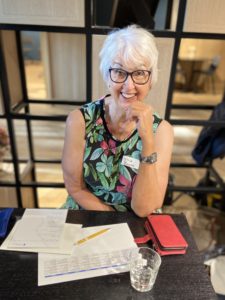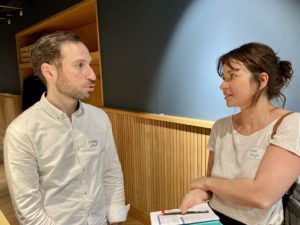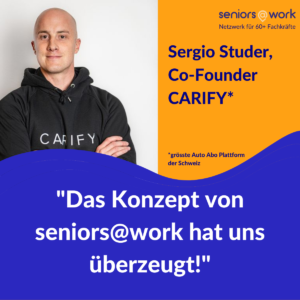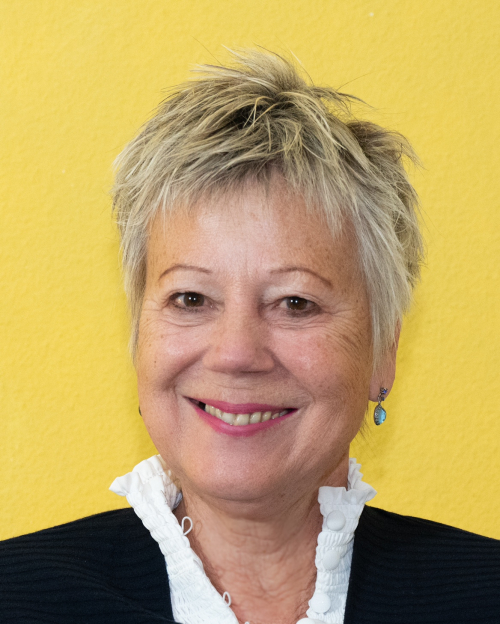
Gen Z and baby boomers: a dream team?
"O.k., boomers!" is often heard derisively from Generation Z and the millennials. That sounds more like a conflict than a dream team. So how and where do the young and the old fit together? Where many people don't expect it: At work. We explain why, and what this means for companies.
It is well known that baby boomers are gradually retiring. But what is new is that more and more of them want to continue working. Why? There are many reasons, but the main one is: Staying professionally active, passing on knowledge, having a purpose, feeling needed, earning something extra.
But hardly any of the older people who are willing to work are looking for a new full-time job. Why should they? Enjoying a bit of retirement, spending time with friends, doing sports, traveling - that's what it's all about. And thanks to the (still) generous Swiss pension, most senior citizens are more concerned with the cause than the money when looking for a job.
So it should be a part-time position. The spectrum is wide, ranging from 10 percent to 80 percent, from regularly every week or as a full-time project for three months. An ad interim management position or a stand-in position if required. A few hours to prepare the annual accounts for an SME or on a commission basis in telesales. On site or from home, preferably with free time management so that the work does not clash with leisure plans. And in such a way that you can have an exchange with nice colleagues in the office as well as the peace and quiet of your own desk in the home office.
If you take a closer look at the desired job models, there are surprisingly many similarities with what Gen Z also wants: work from anywhere, at self-determined times, and please not full-time. In other words, a maximally flexible, hybrid and modular working model, as demanded by the advocates of "New Work". Generation Z has better things to do than subordinate their lives entirely to the dictates of work. It's about work-life balance and the fight against climate change, about purpose and personal freedom.
Companies need to adapt
The tried-and-tested, outdated full-time model that the majority of companies live by and propagate is therefore being nibbled at from two sides: from below by the younger generation and from above by the older generation. It is probably only a matter of time before the world of work has to change and declare the modular working models of New Work the new standard. A brave new world of work in which everyone can arrange their own times, workloads and locations to suit them best.
Companies are under pressure to act. There is already a shortage of staff everywhere, fueled by the demographic change of an ageing society and the current post-pandemic economic frenzy around the world. The labor market in Switzerland and abroad is virtually empty, in almost all sectors and at all levels. There is hardly a recruiter who is not complaining about simply not being able to find suitable employees. In such a situation, it seems only logical to adapt to the changing needs of regular employees and to work with other groups (retirees).
Intergenerational teams
One full-time position becomes three part-time positions - in job sharing models or simply with different tasks. This will become just as important in the future as outsourcing work to freelancers (keyword: gig economy) and short-term assignments for substitutes and temporary workers. Employees who are not "stuck" in a 100% full-time position and are only available with a long lead time are particularly valuable here. It is quite clear that all of this is a challenge for the organization of work in companies. But "business as usual" simply won't work.
But such a reorganization has even more advantages for companies. It has been scientifically proven that when young and old move closer together and cross-generational teams become the norm, the output of the teams also improves. The more diverse the teams, the better the results. And in times when D&I initiatives are becoming increasingly important, excluding the elderly is definitely "out".

The future belongs to the elderly!
Despite all the youth mania, the future belongs to the elderly. And it's high time we took the 60+ generation seriously. Why? One explanation.
The population is ageing. This is nothing new. But now that 55-year-olds already make up the highest proportion of the population in Switzerland and more and more baby boomers are retiring by the dozen, quite a few companies are finally starting to take the previously overlooked, ridiculed and sidelined group of senior citizens a little more seriously.
This increased focus is primarily driven by self-interest, above all by the unprecedented staff shortage in summer 2022. In addition to the well-known demographic trend, the economy is currently experiencing a massive post-pandemic reopening - and with it the massive search for staff that was cut during coronavirus. However, the labor markets are virtually empty and not enough applicants can be recruited from abroad either. As a result, companies are suddenly looking at older people in Germany as potential employees. According to the NZZ, there is a lack of suitable applicants, especially for management positions here.
The young old still have big plans
"Finally!", many a senior citizen will think. Because in view of increasing life expectancy and the high standard of living in Switzerland, young old people are fitter, more mobile, more active and more digital than ever before. We often hear that 60 is the new 40. Because they are a long way from a peaceful old age, a rollator and a nursing home. "I get bored just sitting at home," says Remo U., 65, an accountant from Zurich who has been retired for six months. And he is not alone in this. 60 to 75-year-olds in particular want to continue to have a job, pass on their experience and do something good for themselves. Because - and this has been scientifically proven - those who continue their education as they get older, who are curious and mentally fit, stay healthier and can therefore contribute more to the job market.
Even if our society still lives in a veritable youth mania, age is by no means a disadvantage for professional success. In fact, the opposite is true, according to numerous studies (for example in the HBR). After all, knowledge and experience, the main drivers of job performance, increase with age, even up to over 80. No wonder the whole world looks with respect at Warren Buffet, the now 92-year-old star investor from the USA, or that only two of the 46 US presidents were under 50 at the end of their term of office. Konrad Adenauer, Germany's first Chancellor and a defining figure of an entire era, was 87 when he stepped down.
There is also no age limit when it comes to learning new things. The NZZ recently reported that 70-year-olds are more open than 20-year-olds, based on a study by the Gottlieb Duttweiler Institute (here). And who would have thought it, the older the start-up founders are, the more successful they are.
Companies need to adapt
So what is stopping companies in Switzerland from working more with older people? There are definitely enough motivated applicants; the online job platform seniors@work alone has over 10,000 candidates in its database. However, companies' structures are often not yet designed to employ people who are looking for something other than a traditional full-time position. But this is exactly what retirees are pushing for - part-time in any form, ideally in hybrid working models with home office and free time management. But they are not alone in this. Generation Z and the millennials also prefer this new way of working - keyword "New Work". So the change is probably only a matter of time.
Pensioners are also customers
However, senior citizens are becoming increasingly relevant to the economy not only as employees, but also as a group of buyers. This is because with increasing life expectancy, (still) good pensions and future additional wages at retirement age, the affluent clientele of the over-60s is becoming ever larger.
Targeted offers for older people can still be significantly expanded, especially as "senior citizens" are a very large segment, spanning around 30 years. Their interests and needs are correspondingly diverse. And products and services alone are not enough. Rather, older customers could also be looked after by people of a similar age - whether in sales, consulting or telephone support.
In the end, we have come full circle: neither on the employee side nor on the buyer side will we be able to avoid the old in the future!
Start Ups meet Seniors

Start Ups meet Seniors - Review of our 2nd Start Up Speeddating from 18.5.2022
Start-ups and seniors - how do they go together? We at seniors@work know: it's a perfect match! In May 2022, we organized a speed dating event for the second time, where we brought startup founders together with retired executives. Just like at a real speed dating event, each participant only had a few minutes with their counterpart before they had to move on to the next person.
Not so easy to interrupt the discussions and maneuver them from one table to the next! But it shows that all sides had a lot to say and ask each other.
The retired executives, all members of the seniors@work community, were very well represented. In addition to the former CEOs of homegate.ch, Volg, Basler Kantonalbank, Microsoft Switzerland and Nokia Switzerland, a number of HR experts, coaches and sales and digital specialists were also on hand to support the founders. They found the exchange with the founders very exciting. "It's great to see the ideas and drive with which the start-ups go about their work. And it's great that we can use our experience to help the companies move forward," said one of the sparring partners, summing up the evening.
There were eleven founders from the start-up side, who received insights from our retired executives on topics such as business development, growth, customer acquisition, marketing, leadership, etc. The spectrum was broad, with health, new work and the sharing economy well represented alongside some ImmoTech companies - from desk sharing at the workplace to a rental model for baby clothes. "The sparring partners' assessments of the market approach, what works and what doesn't, were particularly helpful," said one of the founders. And, of course, their network in the industry was also in demand.
The fact that the event was a complete success was also clear at the aperitif that followed: there was a lot of talking, hearty laughter and everyone continued to discuss things in an informal setting (and with a cool drink) for a long time - it got late, despite the hot summer temperatures!
If you want to take part in the next Start Up Speed Dating, you can put your name on the waiting list here:
- For start-ups / founders: https://forms.gle/UYSNNaq4PyHA4oPE8
- For retired sparring partners: https://forms.gle/PX9V5hnNkZenf5sL6
This round was attended by:
Retired sparring partners:
- Heinz M. Schwyter, former CEO homegate.ch
- Ferdinand Hirsig, former CEO Volg, former Chairman of the Board of Directors Landi
- Guy Lachappelle, former CEO of Basler Kantonalbank
- Peter Waser, former GL Microsoft Switzerland
- Iris Lentjes, HR Expert & Coach, former GL of various companies
- Peter Wyss, PWP - Start Up / SME Support
- Jürg Hofer, former GL Nokia, Start Ups, Gamification
- Hermann Willaredt, former Deutsche Bank, financial expert and management consultant
- Erica Maurer, former Head of Human Resources at WorldVision
- Marianne Högstedt, former GL Skyguide, HR Consultant
- Andre Schmid, Sales & Business Development, IT/IS
Start Ups / Founders
- Deski, Lionel Ebener
- flat Flip, Markus Kollmayer
- Health.Yourself, Anna Rosenkrantz
- Healthy-Longer, Roland Pfeuti
- Job.Rocks, Fabio Donnaloia
- Joineer, Meret Hottinger
- Miniloop, Anne Voigt
- Novu Office, Falk Weber
- Sparkademy, Celine Heim
- Who is Nik, Simone Alabor
- Zario, Ondrej Zak













Success story: seniors@work connects ex-CEO of Microsoft Switzerland & Start Up
By Annette Ehrhardt, seniors@work
Peter Waser, the former country head of Microsoft Switzerland and CEO of Starmind, has been increasingly active in the start-up world for several years, is involved in numerous projects and also holds several board mandates. He has also been a member of seniors@work for some time - so there's no sign of retirement!
"As a 66-year-old, I still feel needed, and it makes me happy to be able to pass on my experience to young people"says Peter Waser on the background to his broad portfolio of tasks at the various start-ups. "It's a great feeling to help a young company get off the ground and lead it to success."
For example, a start-up in the training sector found him through seniors@work, and the collaboration is a win-win situation for both sides. Peter Waser: "Here I can contribute my experience in building up a young company and help shape a solid business model as a partner. The start-up is still self-financed and I am currently making my contribution pro bono. I don't think I should take the young founder's hard-earned money and start-up capital out of her pocket. When the company generates sales in a few months' time, we will revisit the arrangement. Until then - and beyond - this commitment keeps me on my toes and is a good addition to my other projects and mandates."
Although finding suitable (part-time) work is not always easy for retired specialists and managers, despite all their life experience and flexibility, Peter Waser from the seniors@work job platform is convinced: "Anyone who feels healthy and has life and work experience is in demand. And our economy and our standard of living need all hands and all heads!"

Gray panthers against the shortage of skilled workers - is that the solution?
By Annette Ehrhardt, seniors@work, and Nicole B. Stucki, HR Director Selecta Switzerland
Finding suitable employees, especially experienced specialists, is becoming increasingly difficult. In the discussion about solutions, one potential is usually overlooked: working with retired 60-75 year olds and thus utilizing the immense wealth of experience of the older generation.
When it comes to skills shortages, many people think of software developers, web and IT specialists, AI experts, crypto miners and other very future-oriented professions - and immediately wave them off. After all, these tasks are clearly not the core competence of the over-60s. BUT: there are an incredible number of other areas in which the gaps are huge as more and more baby boomers retire. Not only SMEs, but also large companies are feeling the change in the labor market. According to Nicole B. Stucki, HR Director Selecta Switzerland, the labor market is currently very hot, as a lot of pent-up demand is being made up after the pandemic. "Good conditions for rethinking the job market!" says the expert.
But can this work? In a society driven by a veritable "youth mania", can we suddenly rely on the old? The reality is that it is already difficult to find a new job from the early 50s, if not the late 40s. In fact, there are major reservations about retired specialists, especially in large companies, and working with retirees does not (yet?) fit in with existing processes and habits in HR. Also, the huge group of retirees, i.e. people from 60 to well into their 90s, are still far too often lumped together. Yet "retired" doesn't necessarily mean "old", and for many, 60 is the new 40. So are young retirees automatically frail, old-fashioned and left behind? Nicole B. Stucki: "I hear this accusation very often and I don't share it in this form. Good dossiers combine training and professional experience - and that doesn't work at a young age. It only becomes difficult for older people if their CV doesn't show a common thread."
On closer inspection, there are many reasons why a company should dare to work with the "old-timers". Here are the five most important ones:
- Extremely motivated and committed employees
If you still want to be active on the job market at this age, you really want to be. Because you could also sit back and enjoy your retirement. For the vast majority of Swiss people, the monthly pension payments are enough to make ends meet. Companies that hire a retiree can therefore be sure of getting genuine enthusiasm and motivation. Especially those who have worked in high-profile positions cannot and do not want to go from 100 to 0 overnight. A task, the feeling of being needed and the passion to pass on one's own knowledge and many years of experience are important driving forces.
- Flexible, fast availability to cover short-term requirements
Retirees often have many leisure activities, but they are not tied to other employment contracts and are usually spontaneously and quickly available. The vast majority are also not interested in a permanent full-time job. They are therefore ideal employees to cover short-term absences due to illness, accidents, maternity leave, vacations or other unforeseen events in the company. Unlike many temporary workers, they are highly qualified and very experienced in their field.
- Diversity in the team and a cross-generational approach ensure better results
It is now well known that mixed teams deliver better results than homogeneous groups. This applies not only to gender, origin and education, but also to age. Start-ups are happy to receive coaching and mentoring from former managers, learners willingly turn to experienced older people, and the prudence and life experience of retirees are important soft skills from which everyone benefits. "HR departments have recognized all of this, but unfortunately recruitment still too often looks for the profiles they already have - instead of complementary profiles. And of course that doesn't promote diversity in teams," says Nicole B. Stucki.
- Retirees fit in perfectly with "new work", the "gig economy" and Generation Z.
Many young people are looking for alternatives to the typical 100% full-time job. Job sharing, 80% models, sabbaticals, remote work, part-time work, freelancing, less loyalty to the company... all of these are on the rise and are giving HR departments a headache about how to manage all activities within the company. So the world of work is changing, and retired professionals fit very well into this new world. They are looking for part-time jobs, usually 20-80 percent, temporary projects or jobs on an hourly basis. They no longer want to make long-term commitments and want to enjoy their freedom just as much as Generation Z. Nicole B. Stucki: "Every generation brings new ideas to the world of work, and that's a good thing. Today, more and more men and women are working part-time, especially while the children are young. A more recent phenomenon, driven by the pandemic, is of course a high proportion of people working from home. But what's also new is that people want to continue working from home because they've acquired a dog or another pet during this time."
- Cheaper alternative due to low non-wage labor costs
Last but not least, the use of retired employees also pays off for companies. This is because those who have reached the statutory retirement age of 65 or 64 no longer have to pay BVG contributions. A not insignificant factor in the wage bill! Contributions for AHV, EV and IO are also only due from an annual exemption amount. Those who employ senior executives of retirement age also benefit from the fact that these employees are less concerned with salary than with other things, so that they often work for lower salaries than, for example, employees in their mid-fifties who are not yet drawing a pension.
The list of benefits could be extended, for example older employees are also good salespeople or customer advisors for older customers - because increasing life expectancy means that this affluent clientele is also becoming more and more interesting. And the social benefits of doing something to combat loneliness in old age (and in some cases poverty in old age) should not be neglected either.
Conclusion: Retired employees are by no means the panacea for the shortage of skilled workers, but they can make an important contribution. Nicole B. Stucki summarizes: "Companies should therefore be brave enough to give them a chance. For example, we are currently working with a retired headhunter and can no longer imagine working without him. Fortunately, the level of motivation and curiosity is still the most important ingredient for a fulfilling professional life, regardless of age."

Client of the month (04/2022): Christian Witwicki, courierfactory
seniors@work: Mr. Witwicki, you are the CEO and - together with your wife - founder of courierfactory GmbH, a specialist for scheduled shipments in the pharmaceutical sector. You are a "manufactory" with 38 employees in Switzerland and Germany, where speed, precision and an individual approach to each customer are important. You have already recruited three retired specialists via seniors@work, and you have recently placed two more advertisements with us. How did this come about?
Christian Witwicki: I'm over 60 myself and it annoys me every time I see how many companies treat experienced employees over 50. So much potential, experience and loyalty is simply "thrown away". That's not right! My ideal is much more to have people from 20 to 60 in the company so that everyone can benefit from different perspectives and life experiences, whether young or old, male or female. Just as it used to be in an extended family - that also fits in well with our family business.
seniors@work: So the shortage of skilled workers was less of a reason for you to hire retired applicants?
Christian Witwicki: Finding good employees is a Herculean task. Especially for a company as specialized as ours, which operates 365 days a year, it's not easy. There is also no training for exactly our requirements. We are therefore looking for open, lively doers who are willing to adapt to new tasks and teams. Fortunately, we have been able to find good people through word of mouth so far, but the shortage of skilled workers due to the retirement of the baby boomer generation will of course hit us much harder in the future.
seniors@work: How did you find out about seniors@work?
Christian Witwicki: I think I saw something about the platform somewhere in the media, but I can't remember exactly. But since I already hired the first candidates from seniors@work in 2020, the platform is already part of my standard repertoire when I'm looking for employees.
seniors@work: Of course we are very pleased about that! What positions have you filled with retired candidates so far?
Christian Witwicki: It varies greatly, but of course we are looking for positions that do not involve a high level of physical exertion, but rather tasks in incoming orders and scheduling. For example, we are currently looking for someone to support a divisional manager and build up a completely new subject area - so we really need young-at-heart, active people who are open to new challenges.
seniors@work: And do you always give part-time jobs to retired candidates?
Christian Witwicki: Yes, that simply suits the requirements of the retirees best - and so far we have always found a workload that suits everyone. As a rule, it's 50-80 percent. Although young people nowadays would also like to work 80 percent.
seniors@work: Not Many companies already have so much experience in employing retired specialists. What do you have to watch out for?
Christian Witwicki: As a company, you should be open to the life experience of older candidates. I can't understand the occasional concern that older people don't fit into the team, because I place great emphasis on a cross-generational approach. Of course, the team has to be right, but I let all promising applicants work on a trial basis anyway - no matter how old! - and then we decide as a team whether it's a good fit or not. You can't lump the older generation together when it comes to digitalization either. After all, today's 64-year-olds experienced all of this before they retired. And as I said, those who are open and willing to learn will cope well. And what many people forget is the BVG: These contributions are very high before retirement, but are eliminated after retirement!

The Zurich start-up CARIFY (www.carify.me) is now known throughout the country as the largest platform for car subscriptions in Switzerland. Customers can change their car according to their mood (or the weather and season): a convertible in summer, an SUV in winter. The dream of many drivers!
CARIFY needs reliable drivers to take the cars from the dealership to the customer's home or workplace so that the vehicles can also be delivered to the customer's home or workplace. To this end, the platform has been working with retired people from seniors@work for three years. "We looked at various options and came across the seniors@work platform. The concept convinced us," says Sergio Studer, co-founder of CARIFY.
"The contact with the garage owners and customers, but also with our team, as well as the opportunity to drive great cars, offers the senior citizens an interesting task, and we really appreciate this support and cooperation. The seniors do a great job and some of them are also very interested in supporting us in other areas of the company," says Sergio Studer.
Cyril, Elisabeth and Marlies, three people in their mid-sixties, were the first three retirees CARIFY recruited from seniors@work in 2020. Currently (March 2022), Sergio and his expanding CARIFY team are looking for more drivers via seniors@work - the collaboration continues!
Meet our founders!
A conversation with Alexis and Annette from seniors@work
seniors@work: Alexis, you founded seniors@work in 2018 and are the heart and soul of the start-up. Why don't you introduce yourself to our readers?
Alexis Weil: Yes, seniors@work really is a matter close to my heart! About me: I am 31 years old, come from Basel and studied Finance and Accounting at the University of St. Gallen before I founded seniors@work.
seniors@work: How did this come about?
Alexis Weil: When my father retired, he still felt young and active and wanted to continue working part-time - but it was almost impossible to find suitable job offers. I then did a bit of research, and the more I looked into the topic of "working in old age", the more I realized that this is a very important topic for the future - not only for fit young retirees who have a whole new phase of life ahead of them, but also for companies that are increasingly suffering from a shortage of skilled workers. This gave rise to the idea for seniors@work.
seniors@work: And how did you go about it?
Alexis Weil: With the help of a programmer, I set up the job platform in 2018, recruited the first retired people as candidates and looked for clients. Once the website was up and running, I was lucky enough to have three "lions" from the Swiss Lion's Den - Roland Brack, Bettina Hein and Tobias Reichmuth - invest in me in May 2019. After that, the work really started, because as a single founder, there are never enough hours in the day to complete all the tasks! Today we have over 3,000 candidate profiles on the platform, more and more job offers, and our monthly income is growing strongly. And to accelerate this growth, I started looking for a CMO and co-founder in the second half of 2021...
seniors@work: Perfect transition, because that's where Annette comes in. Can you also briefly introduce yourself?
Annette Ehrhardt: Yes, I would love to! I've been on board since January 2022 and have loved every minute so far! At 45, I'm a bit older than Alexis and have almost 20 years of experience in management consulting and marketing. I'm originally from Germany, but have lived near Zurich since 2009, and my two children were also born here. Alexis and I complement each other very well with our experience and skills, and we were also a good fit on a personal level right from the start - that's very important when you work so closely together in a small team!
seniors@work: How did you come to switch to a start-up?
Annette Ehrhardt: After so many years in the corporate world, I felt it was time for a change. Also, like so many people, at the beginning of the pandemic I thought a little harder about my professional priorities. As I wanted to make a difference and have a broader field of activity than in my well-paid corporate job, I specifically looked around for start-up roles - and when I came across Alexis, it immediately clicked for me. Because I think the social significance of seniors@work is really great! Opening up career prospects for retired people and at the same time helping companies that are desperately looking for staff is a huge motivation for me.
seniors@work: What do you enjoy most about working in a start-up?
Alexis Weil: The freedom and agility are important factors. Simply making your own decisions, testing things quickly and implementing them straight away - that's exactly my thing. And when I see how many retirees we have already been able to offer a career perspective, it makes me proud!
Annette Ehrhardt: I can only agree with that! What Alexis has achieved so far is mega impressive. And for me, the "Lean Start Up" approach is very refreshing. Roll up your sleeves and just get on with it, that's our motto.
seniors@work: And what are your biggest challenges?
Alexis Weil: Socially, the topics of "old age" and "senior citizens" still tend to have a negative connotation, so we still have some work to do to raise awareness. It will certainly take patience and a lot of staying power before the majority of companies specifically hire retired specialists on a part-time basis.
Annette Ehrhardt: And here internally, we also have to manage the growth we have set ourselves - growing the team, improving our platform, expanding... these are no small tasks!
seniors@work: Speaking of growth and expansion: where do you see seniors@work in five years' time?
Alexis Weil: Oh, we certainly won't be bored! First of all, we are focusing entirely on becoming the market leader for jobs for retired professionals in German-speaking Switzerland - with over 1.5 million retirees and a shortage of 500,000 professionals over the next few years, the potential is enormous!
Annette Ehrhardt: But that's not all. In the medium term, we also want to expand into Germany and Austria and extend our member community to areas such as friendships, dating, sport, travel and learning.

Candidate of the month (03/2022): Iris Lentjes, HR Expertin
seniors@work: Iris, you can look back on an impressive career as HR Manager and member of the Executive Board at a number of well-known companies such as Livit (Uto Albis), MSC, Bombardier and Weka Business Media. And long before you retired, you also worked independently as a leadership coach and HR consultant. Today, at 69, you are more active than ever. What is your secret?
Iris Lentjes: I love working with people, learning new things and am happy to help shape change. There is no "expiration date" for this. It's a great feeling when my clients achieve their goals with my help and I realize that I'm needed. Especially when coaching managers, it is an advantage to have extensive life experience.
seniors@work: What are the major differences between employment and self-employment?
Iris Lentjes: Being self-employed allows me to organize my time relatively freely, which is a big plus. And I feel more valued than I did as an employee. This direct, positive feedback from my customers is an important driving force. Apart from that, I am and will remain a service provider.
seniors@work: That sounds as if "serving" people is really a passion for you?
Iris Lentjes: You could say that! To date, only my first apprenticeship had little to do with people. I trained as a reinforced concrete draughtswoman and already realized in my first year of training that this wasn't for me. Because contact with people is incredibly important to me. After completing my apprenticeship, I immediately changed careers and focused on HR. After various further training courses and lots of personal development training, I then worked successfully in several service companies as HR manager. And for 20 years now I have been working independently as a sparring partner for managers and as HR manager in an SME (at mandate level) - always close to people!
seniors@work: How much do you work at the moment, and how long do you plan to remain professionally active?
Iris Lentjes: I currently work about 30 hours a week and enjoy both work and leisure. Because I don't have to work, I want to work! I will continue as long as I am healthy and able to learn - and of course as long as the customers want me!
seniors@work: You were already self-employed long before seniors@work existed. What prompted you to register with us?
Iris Lentjes: The platform is a great offer and Alexis, the founder, is very committed. I think it's very important that people have the opportunity to take on exciting professional tasks after retirement.
seniors@work: Today is International Women's Day. Based on your professional experience, do you have any advice you would give to younger women?
Iris Lentjes: For me, it's always about people first and foremost, not so much about gender roles. For me, it's all about working together - not against each other! I can recommend this to all younger women: If you want to lead, it has to come from the heart. Love people and don't bend yourself. And take yourself just as seriously as the others.
"Methusalix (French: Agecanonix) is the village elder. He is 93 years old and is a member of the village council. However, his age does not prevent him from taking part in the village fights; he even gets offended when someone wants to go easy on him because of his age. He cleverly uses his walking stick as a weapon, while the retaliatory carriages he receives are often aimed at other villagers because he is considered too old to be beaten."
Dear reader, Asterix and Obelix have accompanied many of us through our youth. But the fact that Methusalix has settled in Basel surprises us and makes us smile. In fact, there is a project called www.methusalix.ch. It's a residential project in Lysbüchel. Curious, I knocked on the door of our neighbor, Dieter Häner. He is the initiator of this project and will also be moving in. But read for yourself:
Dear Dieter, you are named on the Methusalix homepage. How did that come about?
The Methusalix project was my initiative, initially under the bland name "Living in old age". This name encompasses the basic idea, but the age was to be hinted at with a wink, which is how I came up with Methusalix. The homepage introduces the board of the methusalix housing cooperative and I appear there as treasurer.
You are a group of people who are planning and carrying out this housing project. How did you come about?
We are 9 parties with a total of 13 people who came together during the course of the project. In the first phase, we were a core group of four people, with a steady stream of interested friends and acquaintances joining us (and some saying goodbye again), until the current residents were finally formed.
How many years in advance do you plan a project like this?
I have heard from various sources that it is difficult or even impossible to plan such a project without being able to show a concrete object. It was the same with methusalix. My idea of an age-appropriate form of housing had been around for some time, but it was only when the tender for the development of the Lysbüchel site was published that we were able to start planning in earnest. In our case, that was just over three years ago. The first parties will move in at the end of April 2021.
Was it difficult to find a suitable new-build project? Or did you also look at existing old buildings?
If a residential project is not only to meet all the requirements for age-appropriate living, but also meet the demands for sustainability, energy efficiency and affordable living space, it can only be achieved with a new build. Renovating an old building in this way would go far beyond the budget. It should be emphasized that a new building on urban land with low rents can only be realized if the building land is granted building rights. In Basel, it is the Habitat Foundation that makes many of its plots available in an exemplary manner.
When the "Lysbüchel Süd" development was put out to tender in spring 2018, we applied with a preliminary project.
How is such a project financed?
In order to be able to finance such a project, you need to know exactly which housing subsidy options can be used. We were lucky enough to find an architect in our circle of friends who had already completed a similar housing project with his office. After winning the bid from the Habitat Foundation, we set about founding a housing cooperative. Because only with a suitable organizational form (it could also be an association or a company) can the building lease agreement and the applications for favourable loans be concluded or submitted.
I assume that all of you in the core group are already retired. What specialist professions were required to set up Methusalix?
No, not everyone has retired yet. What's most in demand are professions that have to do with building and furnishing, and someone who knows a bit about finance. But a good architect's office takes many problems and tasks off your hands.
Have you discussed the pros and cons of living together?
The situation is as follows: we have 5 2-room and 4 3-room apartments, all with kitchen, bathroom and balcony. This means that each party can live on their own without having to worry about the others. The idea, however, is to maintain lively contact between the residents. On the one hand, a spacious stairwell with benches and plants on each floor serves this purpose. We want to encourage people to take the stairs (as long as they can) and perhaps stop for a chat on the way. On the other hand, we have set up a club room on the first floor that can also be used by the residents. Film evenings, concerts, readings and festivities are planned. This actually only has advantages, the disadvantages are - so far - none recognizable.
Do you know Seniors@Work?
I only know Seniors@Work from PR appearances in public.
If some of the know-how is missing in your group: could the knowledge of the seniors from Seniors@Work be useful to you?
What a similar group might lack are accounting skills, organizational talents, people with a flair for house maintenance.
Dear Dieter, I wish you every success with your exciting and innovative project!
You also gave me the following tip: "In the original version of "Asterix and Obelix", Methusalix appears as Agecanonix. Methusalix (French Agecanonix, "canonical age", i.e. "ancient") is a veteran of the battles of Gergovia and Alesia and has long been the village elder."
Should you become the village elder of the community in Basel, I very much hope that everyone will bow down to you respectfully! 😉
And thank you very much for the interview.
Beatrice Isler

